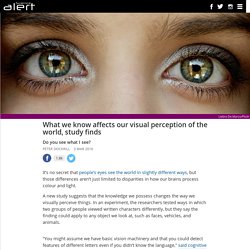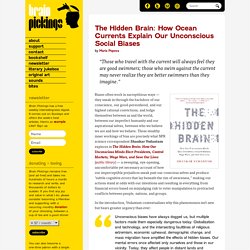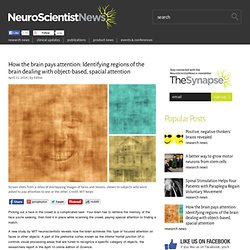

What we know affects our visual perception of the world, study finds. It’s no secret that people’s eyes see the world in slightly different ways, but those differences aren’t just limited to disparities in how our brains process colour and light.

A new study suggests that the knowledge we possess changes the way we visually perceive things. In an experiment, the researchers tested ways in which two groups of people viewed written characters differently, but they say the finding could apply to any object we look at, such as faces, vehicles, and animals. "You might assume we have basic vision machinery and that you could detect features of different letters even if you didn’t know the language," said cognitive scientist Brenda Rapp from Johns Hopkins University.
"But that’s not the case. What you know affects how you see things. " Mihaly Csikszentmihalyi: Flow, the secret to happiness. The Hidden Brain: How Ocean Currents Explain Our Unconscious Social Biases. By Maria Popova “Those who travel with the current will always feel they are good swimmers; those who swim against the current may never realize they are better swimmers than they imagine.”

Biases often work in surreptitious ways — they sneak in through the backdoor of our conscience, our good-personhood, and our highest rational convictions, and lodge themselves between us and the world, between our imperfect humanity and our aspirational selves, between who we believe we are and how we behave. In the introduction, Vedantam contextualizes why this phenomenon isn’t new but bears greater urgency than ever: Unconscious biases have always dogged us, but multiple factors made them especially dangerous today. Globalization and technology, and the intersecting faultlines of religious extremism, economic upheaval, demographic change, and mass migration have amplified the effects of hidden biases. Illustration from the 1970 book 'I’m Glad I’m a Boy! Vedantam writes: Donating = Loving. How the brain pays attention: Identifying regions of the brain dealing with object-based, spacial attention. Picking out a face in the crowd is a complicated task: Your brain has to retrieve the memory of the face you're seeking, then hold it in place while scanning the crowd, paying special attention to finding a match.

A new study by MIT neuroscientists reveals how the brain achieves this type of focused attention on faces or other objects: A part of the prefrontal cortex known as the inferior frontal junction (IFJ) controls visual processing areas that are tuned to recognize a specific category of objects, the researchers report in the April 10 online edition of Science. Scientists know much less about this type of attention, known as object-based attention, than spatial attention, which involves focusing on what's happening in a particular location. "The interactions are surprisingly similar to those seen in spatial attention," Desimone says.
"It seems like it's a parallel process involving different areas. " "We wanted to frequency-tag each stimulus with different rhythms. 5 Things Magicians Knew Before Scientists Did. Magicians are in the business of testing the limits and nature of human perception.

It's no surprise, then, that today's cognitive scientists are uncovering features of the mind that magicians have understood (and exploited) for hundreds of years. A close look at some of the many books on conjuring published since the 16th century reveals insights that are only now making their way into the scientific literature. 1. Don’t Look Now, But... Sleight-of-hand artists have long used subtle eye movements to manipulate the attention of their audiences. In recent years, the effect of "gaze perception" on everything from attention to social cognition has become a rich area of psychological research. 2.
Yet another topic to catch fire among cognitive scientists in the last two decades is so-called “change blindness,” or, as researchers Daniel Simons and Ronald Rensink have described it, “the striking failure to see large changes that normally would be noticed easily.” 3. 4. 5. Can You Experience Déja Vu of a Place or Situation You've Never Encountered? Can you experience déjà vu of a place or situation you've never encountered?

— Ellen Smucker-Green Nashville, Tenn. Alan Brown, professor in the department of psychology at Southern Methodist University, Dallas, responds: Déjà vu is a startling mental event. The phenomenon involves a strong feeling that an experience is familiar, despite sensing or knowing that it never happened before. Most people have experienced déjà vu at some point in their life, but it occurs infrequently, perhaps once or twice a year at most. Although déjà vu often feels supernatural or paranormal, glitches in the brain might be to blame. Other phenomena might also help explain déjà vu, such as inattentiveness. In a recent study, Elizabeth Marsh of Duke University and I investigated this idea. A third possibility is that we have forgotten the prior experience. Recalibrate Your Reality. The Art of Looking: What 11 Experts Teach Us about Seeing Our Familiar City Block with New Eyes. By Maria Popova “Attention is an intentional, unapologetic discriminator.

It asks what is relevant right now, and gears us up to notice only that.” Lumosity. Cognitive Electrophysiology of Attention, 1st Edition.